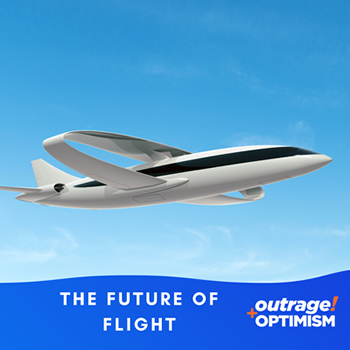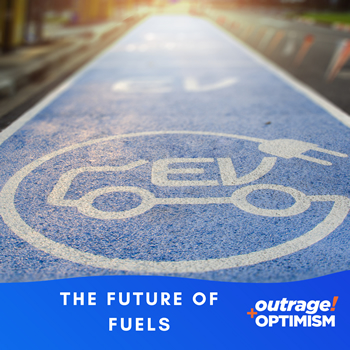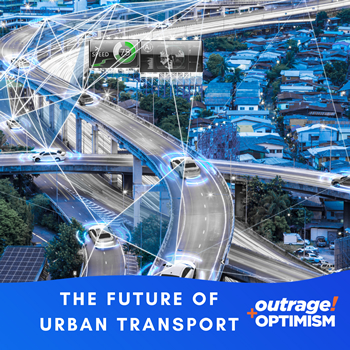85: The Future of Shipping
This is our third episode of an Outrage + Optimism investigative series on The Future of Transport.
About this episode
This is our third episode of an Outrage + Optimism investigative series on The Future of Transport.
With 2020 barely in the rearview mirror, the pandemic rages on across the globe, new variants bringing concern and unified collective action to the forefront as a rapidly developed vaccine begins being administered as we speed into 2021.
That same resolve needs to be applied to climate change and the sectors in most urgent need of decarbonisation. And this week, we dive into the future of sustainable shipping.
We rarely ever think about the things we buy as being transported by sea, but shipping has been the backbone of global economies for thousands of years and today accounts for 90% of world trade. It is responsible for 2-3% of global emissions which if it were a country, would put it on a par with Germany – the world’s sixth biggest emitter.
The challenge to decarbonise shipping is huge. With around 60,000 vessels currently in operation emissions are expected to be 50% higher in 2050 than in 2018.
So how to turn this ship around? Our hosts Christiana Figueres, Tom Rivett-Carnac, and Paul Dickinson speak to scientists, CEOs, politicians and pioneers committed to charting a course to a more sustainable shipping future.
—
Help us shape Season 3 of Outrage + Optimism by filling out our short listener survey! – Thank you!
Listen to the previous episodes of our miniseries here – The Future of Transport
This series is sponsored by NESTE
Full Transcript
Transcript generated by AI. While we aim for accuracy, errors may still occur. Please refer to the episode’s audio for the definitive version
Tom Rivett-Carnac: [00:00:19] This week in a break from our normal format, we bring you the third in a special series of episodes looking at the future of sustainable transport and its importance in reaching the global target of net zero by 2015. 2020 was a year like no other in living memory, with a pandemic that killed more than one and a half million people, decimated economies and destroyed livelihoods. But it also demonstrated the power of collective action and the ability of people to rapidly change their behaviour for the common good. The 2020s is a decisive decade and as we enter a new year, that same resolve needs to be applied to climate change and the sectors in most urgent need of decarbonisation. Take a look around you. Wherever you may be listening right now, I can guarantee you'll be within touching distance of something that has been transported by sea. Shipping has been the backbone of global economies for thousands of years, and today accounts for 90 percent of world trade. Although considered the most efficient method of transport in terms of cost, it's also responsible for two to three percent of global emissions, which, if it were a country, would put it on par with Germany, the world's sixth biggest emitter. The challenge to decarbonise shipping is huge, with around 60,000 vessels currently in operation, emissions are expected to be 50 percent higher in 2050 than in 2018. So how to turn the ship around? We speak to scientists, CEOs, politicians and pioneers committed to charting a course to a more sustainable shipping future. Thanks for being here.
Tom Rivett-Carnac: [00:03:03] So, Christiana, you have a very personal connection to this subject. Take us back to 2018, if you will, and your involvement in talks at the International Maritime Organization, the U.N. agency responsible for regulating shipping.
Christiana Figueres: [00:03:18] Well, you see, although I had already finished my term at the climate change convention in 2016, I was involved at the IMO, headquartered in London, in 2018, supporting those government representatives who were working for an ambitious target of emission reductions from the shipping industry not covered by the climate change convention. It was clearly not easy, but in the end the IMO adopted a so-called initial strategy to start the industry on the path toward decarbonisation. That initial ambition had to be reviewed and hopefully increased in 2020. So, you can imagine how disappointed I am that the revision of the IMO is actually a step back from the initial strategy. It is not a step forward. It is a step back and it does not take the industry anywhere close to the Paris agreement targets. Now, honestly, there's no question that getting an ambitious consensus on emission reductions from shipping presents a huge political challenge, no doubt. But frankly, it's also a technology transformation challenge,
Jules Kortenhorst: [00:04:45] So let's first talk about the chicken and the egg problem.
Christiana Figueres: [00:04:49] Jules Kortenhorst is the CEO of the Rocky Mountain Institute and a leading expert on global energy issues and climate change.
Jules Kortenhorst: [00:05:01] We're going to have to move shipping away from burning that nasty stuff called marine diesel. It is the absolute grub hub at the bottom of the barrel. It's the nastiest stuff that you can burn. And we need to move away from burning that product to clean fuels of the future, fuels that do not bring new greenhouse gases into the atmosphere. So most likely that is something that is derived from clean electricity. So, then we're talking about hydrogen from electrolysis or because hydrogen is not that easy to store and move around, potentially a green ammonia where ammonia is produced from a green hydrogen and is actually suitable for burning in a ship's engine. But ships travel all around the world, imports. You need infrastructure to fuel them. You need the plants to produce that fuel. Those plants will only get built if they know that there is demand, that demand will only emerge from the price of the fuel is low enough and that gets us to the chicken and the egg problem. Right now, there are no ships around that can sail on hydrogen or on green ammonia. There are no ports that can bunker those fuels and there are no producers that make that fuel. So who's going to take the next step forward? And for that, we have to bring the industry together.
Christiana Figueres: [00:06:42] But when that industry involves an incredibly complex network of players, shipbuilders, engineers, energy suppliers, financiers, ports and charterers, what's the way out of the chicken and egg dilemma?
Load MoreJules Kortenhorst: [00:07:03] I think certainly there are some policy instruments that can help. But I think there's an important role also for creating shared commitments, a understanding of what the future will look like. And everybody saying, yes, I'm signing up to this. If the 20 largest ports in the world and the biggest builders of ship engines and the suppliers of clean energy and some of the largest shipping companies all say “OK, so what we are saying is we're going to do this over the next 10 years and we know we can then sell the capacity of those clean burning ships more easily to charterers and companies that need to ship goods because it's clean and therefore it attracts a small premium price”. And that obviously would move the whole industry forward. And you see time and again that it is individual companies and individual leaders within those companies that take charge and say, let's do this, shout out to Maersk, the Danish shipping company that was at the forefront of saying we need to have a more ambitious future and a bolder outlook.
Christiana Figueres: [00:08:11] We will be speaking to Maersk shortly. But first, we also need to acknowledge time is running out. Research carried out by the UK's Tyndall Centre for Climate Change at the University of Manchester shows that new efficient ships alone won't be enough to curb Shipping's environmental damage. Given the typical lifespan of a modern ship is anywhere between 25 to 30 years, steps need to be taken today to reduce emissions from existing fleets. James Mason is one of the report's authors.
James Mason: [00:08:45] Some of the research that we've done here at the Tyndall Centre has actually shown that it's the short term reductions that are vital first in the Paris agreement goals. Now, that's because once we emit carbon dioxide actually remains in the atmosphere for hundreds, if not thousands of years. So it actually builds up. And right now, our emissions are high. So we need to cut them in the short term to stop them from building up. And there are lots of options available to ships. Now to do this. One that my research looks at in particular is something called wind propulsion, which I think is quite ironic because it's actually fitting sails back on ships. And I look at combining that specifically with something called voyage optimization, which acts is like a satnav, where it guides the sailing ships to areas of ocean with beneficial winds to further increase the carbon reductions that these ships can get. And there are other things, such as a propeller design improvements, reducing the resistance of ships through something called air lubrication, which is really interesting because they actually pump, continuously pump, air bubbles underneath the ship's hull to reduce the resistance of the ship's hull in the in the water. And then there's shore power as well, where ships actually plug in and use electricity when they’re in ports to to reduce their carbon emissions because it's more efficient than burning fuel. The options depend on the type of ship, for example, for smaller ships, electricity might be more applicable, whereas the battery technology just isn't there yet for these larger ships. And then one thing that I think is really important to point out is that slowing down can actually really help to save fuel. Some of my research has shown that slowing down by just 20 percent can save a quarter of a fuel for some ships in the long term, these low carbon options with alternative fuels are the way forward. But right now, in the short term, there are plenty of options out there for ships.
Christiana Figueres: [00:10:48] However, while the cost of fossil fuels remains so low, there is no immediate economic incentive to use low carbon alternatives. Biofuels are used by some vessels, but aren't considered viable in the long term.Tyndall Centre researcher and report co-author Simon Bullock.
Simon Bullock: [00:11:07] One problem that shipping and aviation both face, which isn't the case in road transport, is that their fuels don't pay any tax by international convention. So it's very hard for new fuels like ammonia or hydrogen to compete with diesel. So diesels had decades of subsidy. It still doesn't pay any tax and progress on pricing shipping fuels has been historically desperately slow. For the first time in the last year, we've seen two serious proposals to tax marine fuel, one from the International Chamber of Shipping at two dollars a tonne and another from Trafigura, the big charterers for a tax of two hundred dollars a tonne. So a big range there. But even the small tax would raise five billion pounds for R&D on low carbon fuels. So it's not it's not a minor thing. But the this area of carbon fuel pricing wasn't taken forward at the November IMO meeting. There is a lot of inertia and delay and difficulty in moving things forward. It's not to say that the IMO doesn't get things done. The air pollution targets they set recently have been very effective. But on climate change and carbon pricing, there's still quite a long way to go.
Christiana Figueres: [00:12:23] Diane Gilpin, founder and CEO of Smart Lean Shipping, is also seeing a real demand for change in the industry, she's applying her experience in Formula One and yacht racing to smart shipping solutions.
Diane Gilpin: [00:12:39] The key to the work that we're doing here is that the climate emergences is really the mother of all races. And I think we need to bring the racing mindset to bear on how we approach the challenge. And I think what I thought I could bring to this space was a new mindset, which is really around, you know, the shipping industry is determined to frame itself as hard to decarbonise and I don't think that that's necessarily true. And I think if we approach it in the kind of way that we would approach a Formula One season, which is that every race, you're going to get better and better and better, then we approach this challenge in exactly the same way. We bring together a team of experts from different areas of technology, software management, insurance, all elements of the system to solve a particular problem. And so that seemed to me like a good way to approach the decarbonisation of shipping problem. And so we set up Smart Green Shipping. The problem that we have with shipping is that we need to start rapidly decarbonising it. And so we've developed a 40 metre high, automated, intelligent wing sail that can save up to 25 percent fuel when retrofitted on to existing ships.
Diane Gilpin: [00:13:56] And that's enabled by a lot of digital science that's supported by the European Space Agency, for example. And so we can predict the amount of wind that will be available. We can optimize the power cool off combination between the wing sails and the engine. And then once we've installed those, which we hope to be doing within a year, then we start to learn from the data that we're generating, from the experiences that we are having through the retrofit models and through the retrofit in real life. And we can start to improve the retrofit technology, but we can also start to think about how do we build 100 percent renewable newbuild? And because the wings are made from aluminium and steel where we will begin trialling a circular economy system. So how do we use that material in a in a smarter way? We reuse it. We have a better residual value from the technology so we can then start to build new economic systems. So the ultimate goal for our team is that by 2030 we will have 100 percent renewable ships in the water and that is 100 percent power is renewable, but it's also 100 percent renewable materials and resources embedded in the build.
Christiana Figueres: [00:15:11] Who would have thought that tried and tested method of wind power and sail would be brought back into play to reduce emissions and save millions in fuel costs? So what is the uptake for these new technologies?
Diane Gilpin: [00:15:29] Everybody we've talked to wants to try the technology. You know, it's a really popular solution. People see the sense in it, but there's no logical way of demonstrating the technology by which I mean logical in the current economic paradigm, because the cargo owners want to use ships that are fitted with wind devices. The ship owners would like to fit the wind devices but don't want to be the first. And that's completely understandable. The finance industry can't finance it until it's proven technology and you can't prove it until it's financed. And so we kind of go round and round the circle and it's a real obstacle and frustration for pretty much everybody that we talk to. You know, we talk to venture capitalists, we talk to renewable energy investors, and they are only really realizing the opportunities that are emerging from the urgent need to decarbonise shipping. And that is a huge commercial opportunity for investors. So what we're doing is working again through our collaboration to put together a sort of patchwork financing program with there’s a bit of government funding. And there's some very brave, risk tolerant financial investors who love the concept of seeing 21st century wing sales deployed, you know, in the modern shipping fleet.
Christiana Figueres: [00:16:52] But given the modern shipping fleet is so diverse with vessel types as varying as a 20 metre tugboat to 240 metres supertankers and the so-called bunkers, which are the ships that carry the fuel itself, where does Diane see this type of technology being scaled?
Diane Gilpin: [00:17:15] Our best target market at the moment is bulkers and tankers. And there are, you know. 10000 of those available that we could start retrofitting now and we think if we retrofitted all of those ships that could be retrofitted with wind, we'd be saving about one percent of global greenhouse gas emissions. So get on with it. Do it now. The thing that happens with innovation is that you do one thing and then someone else goes, oh, I want to do better than that. Why don't we build one of these? And that's what you need to be triggering. We need to be triggering that kind of arms race. And that's, so we don't know what the future looks like. It never looks quite like what we thought it would.
Christiana Figueres: [00:17:59] Now back to Mærsk, a longtime champion of more fuel efficient vessels, but also looking ahead to an even more sustainable future. In twenty eighteen, the world's largest shipping company stated its ambition to become carbon neutral by 2050, a first for the industry. At the time, I spoke to its CEO, Søren Skou.
Søren Skou: [00:18:39] We have worked on our fuel consumption and efficient fuel efficiency diligently for more than a decade, but by by the middle of, you know, in 2015, 2016, we started to realize that efficiency was not really going to solve the problem. Then we actually decided to go ahead and make that bold statement that we wanted to be carbon neutral. The initial reaction was, you know, how can you make such a target, such a goal in 2050 if you don't know how to get there? But I think that I mean, that's not the point. If we are not willing to put a stake in the ground than we are for sure, never going to achieve anything. So we put the stake in the ground. And, you know, this year in 2020, the ship owning companies in our own country and Denmark is actually all signed up to this, uh, this target date of 2050. And we're starting to see also other places in the world and in our particular segment of shipping, which is container shipping. Of course, our customers are all of the, if you will, the big brands, the big retailers of the world. And of course, they have their own agenda here. And they are also increasing pressure on our industry to actually come up with solutions for how to decarbonise, help them decarbonise their global supply chains. So I think that that's the movement that we see today and more and more get involved.
Christiana Figueres: [00:19:58] And having committed to ditching diesel and becoming carbon neutral by 2050, how does Søren see his containerships being fueled in the future?
Søren Skou: [00:20:11] We have identified a couple of of pathways on fuel. One is ammonia and another one is alcohols. And those two fuels are both fuels that can be produced with a starting source of green energy. Both of those fuel types have, you know, special issues. One is, you know, alcohol. The flame point is very low. So there's a safety issue there. The other is ammonia is toxic. So, of course, there's also a safety issue there. But we believe we can solve those problems in two to three years. It will still be a combustion engine as we know it today, which is good because it means there's a chance we can even retrofit existing ships with new pistons and so on. And then three years from now, we expect to buy the first order, if you will, the first series of maybe small container ships that we can operate in a defined geographical area. Then we can go out and make supply contracts with people that can provide, whether it's ammonia or alcohol or methanol and ethanol. And we can fuel the ships that way, get the experience, you know what how it works operationally or help make sure the safety works. And then we can be ready to start ordering, you know, large ships towards the end of this decade. That's the pathway that we see. We have to get this done by 2030 because we have a ship has a life expectancy of somewhere between 20 and 25 years. So we need to start replacing ships by 2030 in order to be ready at 2050.
Christiana Figueres: [00:21:52] Therein lies the Titanic challenge. In order to deliver on ambitious climate targets, zero emission vessels need to enter the fleet by 2030, leaving less than a decade to develop the new marine fuels, technologies and infrastructure required.
Søren Skou: [00:22:09] We have to do a lot of work ourselves to find the solution. I have no ambition of becoming a fuel supplier. That's not part of our strategy, but it's not like we are experiencing that a lot of fuel suppliers out there are coming to us knocking on the door and saying, look, you should use this fuel five years from now or 10 years from now. We actually working on it ourselves so that we can define the fuel we want and then hopefully we can help create a market at that time.
Christiana Figueres: [00:22:42] And now having committed billions of dollars of investment to this journey into a zero carbon future, what will it take to bring others on board?
Søren Skou: [00:22:53] I think the IMO system is what we need. I'm if we will I'm outraged about the lack of ambition level from some member countries. But I also think that they will be proven wrong and that the world will continue to push in this direction. One of the things that I do is that I'm a member of the European version of the roundtable of industry, 55 largest companies in Europe, all kinds of industries. I mean, every CEO there have a some kind of, uh, decarbonisation plan. More than 80 percent already committed to be carbon neutral before 2050 or before. And, you know, when all of these companies, huge companies, they set out to do something, then I'm actually pretty confident that this is going to move the ball in the next decade.
Christiana Figueres: [00:23:52] Another company also moving the ball forward is standalone, one of the world's largest ferry operators, Paul spoke to head of sustainability Erik Lewenhaupt, helped about why decarbonisation is essential to business.
Erik Lewenhaupt: [00:24:09] I think it's hugely important for us as an industry because particularly in my segment, which is short sea shipping, and, you know, we are often working with road transportation or rail, but we're also competing with them in some areas. So for us, we have to make sure that shipping is still the sort of the green leg in a chain of transportation. And once where we're not and, you know, other segments would have surpassed us, then that would be not only bad for business or bad for the planet. I mean, that would be bad for both. So it's really existential, you know, question for us, one huge challenge in our industry is that, you know, we have, what, 50,000 merchant ships on the water roughly in the world. They are tailor made. Almost each and every one is built by a yard on a specific specification from an owner, there's not that long, we don't have any Airbus or Boeing in our industry, we don't have the long series of designs and so on. So to a very large extent, ships are quite individual. And that's also why the solutions in some areas have to be sort of tailor made.
Christiana Figueres: [00:25:30] Recognizing that climate change poses an existential threat to business, Stena Line started trialling some of these solutions decades ago.
Erik Lewenhaupt: [00:25:43] I think it was in 1990 we had our first sure connection to one of the ships here in Rothenburg in our home port, so to say. And the next step has been to sort of gradually expand that. Today we have 14 ships which are connected on onshore power supply. In 2018. We did our first battery hybrid installment, which is basically a container with one megawatt hours of batteries on board, which is installed on one ship, and that electricity powers the auxiliary engines when she is maneuvering in port. And it also takes care of, you know, electricity and heating and cooling and so on. When the ship is in service. Now, that's the step one. The next step will be to have a bigger battery package, which would actually take the ship and supplement a main engine to take her out of the port and into the open water. And then you switch on the main engine of whether it's diesel, methanol, LNG, fuel cells. And then you do the same thing in the other port when you get closer to shore. And that, we believe, is I don't know, it could be two or three years out. The third step is the fully electric ship. Our ambition is to have a actually two fully electric ships on the water by 2030. And this will be a by far the biggest battery installation as of yet. But of course, things are moving fast in our industry, but we're very excited about this. And we call this the Stena Electric Project which will be a service between Sweden and Denmark. And as the intention is. Also part of this electrification journey that we're on, it's also ensuring that you have the right amount of electricity available at the right time.
Erik Lewenhaupt: [00:27:36] So because of a fully electric ship, will we need a large effect and the grid can sometimes be a challenge. So, what we're also looking into together with a couple of partners is whether we can use old road transportation batteries and use them as power banks on the quay side. And that could be for charging a ship. It could be for charging trucks or other vehicles, etc., but that they would have a second life as a large scale power bank. In that case, you could also use, take electricity out of the grid when it's cheaper and available and use it when you need it coming in. The ports are extremely important because it takes two to tango and you need the infrastructure in place in port and you need it on the ship. So this is by all means a collaboration with the ports to have sufficient infrastructure.
Christiana Figueres: [00:28:33] Indeed, the irony of the shipping industry is that a key part of the decarbonisation effort will have to take place not on the water, but on land at the ports. Efforts have already been made with the introduction of lower sulfur fuels to reduce toxic pollution, which kills tens of thousands of people every year. But how to meet the myriad needs of a changing industry is now the burning question.
Jacques Vandermeiren: [00:29:01] Someone has to do the first to make the first step. And as a leading port, I consider this our mission.
Christiana Figueres: [00:29:10] Jacques Vandermeiren is the CEO of the Port of Antwerp, the second largest port in Europe and the biggest economic engine of Belgium.
Jacques Vandermeiren: [00:29:21] And when it comes to sustainability and climate transition and the climate goals of the COP, it's clear that we are part of the problem here in Antwerp. We emit out of the 120 million tonnes of CO2 for the country of Belgium, 18 million tonnes are emitted here in Antwerp. So we are clearly part of the problem, but we want to become part of the solution. Antwerp and Rotterdam are taking this challenge by bringing all the community together and to to bring some concrete building blocks already today. One small, small example is, for instance, the first hydrogen tugboat in the world is currently built somewhere in Spain and will arrive here in the port of Antwerp, end of next year, hopefully. And that will be the first one, hopefully, of a very large fleet in the future. But we took the risk of building the first one and probably it will be the most expensive one in the whole history of hydrogen tugboats.
Christiana Figueres: [00:30:40] That is not the only risk, shock and other point managers will have to take. One of the main dilemmas is investing in the infrastructure to fuel an industry which is still researching what that fuel will be.
Jacques Vandermeiren: [00:30:58] It takes years before you can build a new infrastructure like pipelines. So we have to start now to be ready in 2025 and certainly twenty in 2030. So we have to start without having all the guarantees that the shipping industry will follow. But if we wait to have them all aligned on one alternative solution, which I do not believe is the solution, it will be the first approach with many options and many alternatives which will make our life on land much more complicated because we will have to invest in lots of different infrastructure. But that's, uh, I'm afraid that the way it will, it will happen. So we will have to do the first move. We did the acquisition of a pipeline company having already 750 kilometres of pipelines. But the the idea is to have the expertise of building pipelines so that we are ready now to build pipelines for CO2 and methanol, ammonia, hydrogen between all ports, between the ports of Antwerp and zebrafish, but probably also between the ports of Antwerp and Rotterdam so that we can in this part of the world, we can become the place where we will have the green ports of of the future.
Christiana Figueres: [00:32:34] So the message from some key industry leaders is clear, they're willing to commit to and invest in a decarbonised future for shipping with or without the support of the global shipping community. And they're not the only ones forging ahead.
Ursula Von der Leyen: [00:32:52] We do not have all the answers yet. Today is the start of a journey, but this is Europe's Man on the moon moment.
Christiana Figueres: [00:33:05] That's Ursula Von der Leyen, president of the European Commission, speaking in 2019 at the launch of the European Green Deal, whose aim is to make Europe the first carbon neutral continent by 2050. A cornerstone of that policy is the emissions trading scheme, a cap and trade system whereby companies receive or buy emission allowances. Currently, this does not include shipping emissions. But last year the European Parliament voted in favour of its inclusion. Paul spoke to Jutta Paulus as a member of the European Parliament, who is at the forefront of the campaign to get the proposal passed.
Jutta Paulus: [00:33:52] Having a taxation on bunker fuel would do the trick, but this is unfortunately not possible because we would need all neighbouring states coming on this blanket with us. And so taxing or having shipping, buying emission certificates is the second best option. What we are planning is we will not go for a single company or a single flag state or a single cargo. We are saying every ship over 5000 tons entering an EU or rather a EEA, European economic area, which also comprises Norway, for example, will have to buy these certificates. And if those ships will be obliged to buy those certificates, we can raise a lot of money, which we can use either for own resources for the EU or which is what parliament is proposing, parliament is saying take half of the revenues from the auctioning of these certificates and give them into an ocean fund and use this ocean fund to help decarbonise shipping, because at the moment, bunker fuel is incredibly cheap. I don't think that the IMO is the place where we should wait for ambitious measures, and that's because it is constituted from all member states, all on UN level. It's not only the majority of the states that have to agree, but also the majority of the cargo carried. And then we have the five big flag states which are actually having most of the ships under their flags and they're not represented at the IMO. They are ministers, but by the registration companies. So you have basically industry negotiating with industry and no wonder that nothing happens.
Christiana Figueres: [00:35:52] Jutta is confident the EU's proposal could help accelerate change at the global level, given she says the EU has been able to successfully influence IMO policy in the past.
Jutta Paulus: [00:36:07] The IMO has said at the beginning of the century they said, well, we might think about doing something about emission reduction on the global level, too. And then they started thinking, they thought for a very long time. And at the end of the day, they said, we have some proposals here and we might decide in 2020 whether will we will adopt any measures in 2023. And it took quite a few IMO email meetings until you and its member states found out that IMO will never come forward with anything ambitious. And so the EU decided to at least start counting emissions on their own because before there was no accounting even and the EU came up with the MRV database, which came into force in 2018.
Christiana Figueres: [00:37:02] But she admits there wasn't much appetite for change on show at the latest IMO talks in November of last year.
Jutta Paulus: [00:37:10] I'm in the delegation for the IMO, so the EU has only an observer status there. So we are not allowed to talk, but we are allowed to listen. And it was. Very sobering. It was really very sobering. I'm not allowed to share any secret things because it is not a public meeting, but there were several states that were, well, I'd say close of climate denial. So that's serious, and it's I think it's far too late to be further waiting for the IMO. They have had their turn that could have done something 20 years ago, which they didn't.
Christiana Figueres: [00:38:03] But the proposal of a region moving on its own hasn't been welcomed by many in the global shipping industry.
Peter Hinchliffe: [00:38:10] I'm totally opposed to regional regulation for shipping. It doesn't work. We're talking about a global industry that operates globally and we're talking about ships that are engaged in international trade. So they have to move from one regime to another. And if the rules are different at both ends of the voyage, that is remarkably complex and actually inhibits efficiency.
Christiana Figueres: [00:38:36] Peter Hinsliff is the former secretary general of the International Chamber of Shipping, which represents national ship owner associations at the IMO.
Peter Hinchliffe: [00:38:49] The first thing is that shipping is the great hidden industry, the great hidden part of the global supply chain. Nobody understands the importance of the shipping industry and that without shipping, we will simply not be able to function as a global trading system. So that's part of the problem. The other part of the problem is that the industry is made up of numerous different sectors who operate in completely different ways. There are around about 80,000 merchant ships in the world. Some are tankers, some are container ships. Some are cruise ships, some dry bulk carriers. They all have different trading patterns. They work in different ways with their cargo owners and the contractors. So it just makes it hugely complicated. It is a massively complex system. And trying to find a single rule that will meet all of these different requirements is the real challenge. And when you look at the cost of running a ship, by far the majority of the cost is the crew and the fuel. And it is therefore solely in the interests of the ship owner or the manager to operate the ship as efficiently as possible. And that is the history of shipping. There's always been this thrust towards efficiency. One of the reasons why we ended up with running most ships on heavy fuel oil, which is not a good fuel from an environmental point of view, was because there was a symbiotic relationship between the refining industry that had this heavy fuel as a bottom product needed to get rid of it because they had nothing else to do with it.
Peter Hinchliffe: [00:40:29] And the shipping industry that could buy it at a cheap price and operate it in the most efficient internal combustion engine, which is a diesel engine. And therefore we ended up in that place. But it was entirely driven by efficiency. And so the thrust now towards decarbonisation, I see that as merely an evolution of what has always been this drive for efficiency. The transition from sail to steam took a very long time. You know, people tend to think about it being a moment in time. But actually, when you're dealing with a ship that has a 30 year timescale or trading time, nothing happens very quickly. The timeline for the IMO interim strategy is 20 50. That's the drop dead date. And I think that actually the industry will have already transformed to certainly low carbon, if not completely zero carbon, well before 2050, because the market will drive it. There's a lot of work going on and it all just adds to my optimism that we're on a really good we're in a good place and we're on the right trajectory.
Christiana Figueres: [00:41:34] However, some still doubt the shipping industry's commitment to change Nishan Degnarain is chair of the London School of Economics Ocean Finance Initiative.
Nishan Degnarain: [00:41:44] We've seen investments from the automotive industry. We've seen aviation. We've seen a lot of government funding coming through. There has been almost nothing from the shipping industry. If the shipping industry is serious about change, it needs to invest in the fuels of the future and it will be the competitive advantage. Look at Tesla, for example. You know, 10 years ago, people will say, well, who is this electric vehicle? Who is Elon Musk? And now this summer, Tesla's become the most valuable automotive company in the world, over two hundred billion dollars compared to Toyota with two hundred billion dollars. And so you look at that and say there will be disruptors in this field. And so how do you get the regulators and the existing incumbents out of the way to allow the disruptors to come through? So there are good actors over there who want to transport goods sustainably and there are two levers of influence in my mind. The first lever is a political lever. So if you’ve got the US, you've got the Europe, you've got possibly the UK, which obviously not part of Europe, the EU anymore.
Nishan Degnarain: [00:42:39] And then you get other regions, you know, like Pacific Islands, for example, Indian Ocean Islands, maybe even China, for example, who've made bolder statements on climate than India or Japan. You start to get these regional emission areas and shipping will have no alternative. If they want to be part of these big trading blocs, they will have to reduce their emissions. So that's one lever to how we explore regional emission targets, and that's the pressure we can put on minister of transport around the world to start doing that. The second is putting pressure on these big technology platforms like Amazon, like Google, way that you can buy products from. There should be a carbon labelling. We now know what the calories should look like. We have the ingredients. It is critical for the health of our planet that we need carbon labelling and that should that should be done instantaneously. There is no excuse why you can't put 10 or 20 engineers to build a product or a feature within an e-commerce platform within six months or 12 months.
Christiana Figueres: [00:43:35] So it's clear to drive the innovation required to lessen Shipping's impact on climate change, effort and commitment from a diverse group of actors both inside and outside of the industry is essential. And today we're already seeing some of that innovation in action.
Tech 24 Presenter: [00:43:53] Hello and welcome to this special edition of Tech 24, we’re aboard the Energy Observer. This ex-racing catamaran, powered by hydrogen, is on a six year voyage around the world and is currently sailing along the French Riviera.
Christiana Figueres: [00:44:08] Energy Observer is the first ship to sail around the world powered only by hydrogen, wind and solar. It's the brainchild of a group of French former offshore yacht racers, Louis-Noel Vivies is the general manager.
Louis-Noel Vivies: [00:44:27] You know, we have been chasing cups and trophies and and, you know, prize giving ceremonies. And when we came back home, you know, we understood that at the end of the story, we were just chasing about satisfying our own ego and not chasing something, you know, really important for our children, for our family, our friends, our country. So the idea was to, you know, to use the sponsoring, but to do something else, to do something which is much more relevant for us, for our children, for family, for even for our engineers and for all the industry.
Christiana Figueres: [00:45:06] During its six year voyage, the Energy Observer is not only showcasing the onboard technology, it's also working with communities on land to help provide new energy solutions.
Louis-Noel Vivies: [00:45:20] Today, they are arriving in Guyana, in South America because there is this big space rocket launching base, you know, for the European community. And, you know, the space walk. They use a big amount of hydrogen. It's a liquid nitrogen. Most of it is lost and we are working on some solutions to try to recover some of these lost fatal hydrogen, you say, to use it for the local power stations and for the communities that were there, because Guyana is very specific, you know, that a lot of small villages and there are many buildings and cities along the coastline, but most of the remote areas are just totally isolated. And hydrogen storage solutions are probably a good solution for them in the near future.
Christiana Figueres: [00:46:20] The Energy Observer team is a great example of how a small group of diverse but pioneering minds can come together to overcome exceptional challenges.
Louis-Noel Vivies: [00:46:31] We think that the only solution for the renewables and for a cleaner future it is to accept that a mix, it has to be mixed. If energy is a success today, its first because we mix some merchant Navy officers with some offshore racers, with some pure engineers. The boat is working because we mix, you know, wind, hydrogen generation. So it's a mix of culture and it's a mix of energies. And we strongly believe that if you mix cultures and energies, you can do whatever you want.
Christiana Figueres: [00:47:07] And I, too, believe that collaboration will be key as the shipping industry navigates its way towards a more sustainable and responsible future.
Tom Rivett-Carnac: [00:47:41] So how interesting to get the chance this week to dig into these amazing issues, I mean, it's going to be such an underlying trend as to whether we deal with this issue of climate change, whether we reduce our emissions in line with science, whether we get on top of marine transportation and shipping. Christiana, what a journey you've been on. What do you leave those series of conversations with?
Christiana Figueres: [00:48:00] Well, as I said at the beginning, I was so disappointed by the IMO decision, but honestly, after this conversation with everyone in the field, I'm sort of moving toward optimism again, because I remind myself that not everything depends on regulation and that there are many other levers of change. And especially what is very exciting is when CEOs of large companies have the vision and the courage to push forward no matter what.
Paul Dickinson: [00:48:39] Hmm. I, um, I was touched by this idea that there's something going on that's a little bit complicated. Um, you know, shipping is just like a commodity. But I remember being at a fantastic conference of Temasek, the Singapore Sovereign Wealth Fund in 2010. And there was a big commodities expert there who started saying commodities are going to stop being commodities, that, you know, what defines the commodities it's sort of ubiquitous in the same and homogenized. And that's that's changing now we're starting to get different kinds of commodities and particularly basically low carbon and zero carbon commodities. So I think shipping is going to stop being just this blanket thing, A to B. It's going to be low carbon A to B and high carbon A to B. And that allows customer preference, clever marketing products, services, whole systems to change. And that will fuel innovation, I think. And there could be so much innovation with these super complex, super interesting things. Ships powered by wind entirely until 1784, but now able to be powered in a whole bunch of new ways and very exciting time. Every time we've done one of these transport, uh, deep dives, you know, whether it's whether it's road vehicles or whether it's aeroplanes, we discover that it's just an incredible time of innovation and scientific discovery.
Tom Rivett-Carnac: [00:49:58] It is. And and but honestly, if we don't call this episode, there's something going on that's a little bit complicated and it's a missed opportunity. Now, I would also say that I think that it's interesting to look at this dynamic between the pressure of collective action, which seems to really be struggling in the arena of shipping and individual innovation and the ability to move forward, which seems to be flourishing. Where do you, reversing the question for that, we usually ask our guests in terms of outrage and optimism. Christiana, you've been delving into these questions. Do you feel outraged about the future of shipping or do you feel optimistic?
Christiana Figueres: [00:50:34] Well, of course. What do you think? What a question. I mean come on, come on. Do you want to be fired again, Tom? But seriously, you know, let's think about where the three of us, let alone everyone else, was in their assessment of change in shipping five years ago, right? Yeah. Honestly, we thought shipping is a hard to impossible to abate sector way up there with steel, cement, chemicals, all of those sectors that are going to be impossible to buy. And we were scratching our head like, what on earth are we going to do with that? And as we have heard from all of these stakeholders, it's actually beginning to move not as an organised sector yet. I think what we're beginning to see is if it were a field, we would see little mushrooms popping up here and there. So little mushrooming of solutions. It is not yet a field of promising flowers, but there are little shoots emerging everywhere. And the next step is a normalisation of this, which will then take the sector over to over the hump into a decarbonisation curve. But the fact that in five years we have moved from, frankly, impossible to “hmm, maybe this could be possible”. That is pretty astonishing.
Tom Rivett-Carnac: [00:52:14] I think the next step on that journey is unstoppable, but that may be just a lesson
Paul Dickinson: [00:52:18] From impossible to inevitable.
Christiana Figueres: [00:52:18] We’re not there yet, but we are on our way.
Tom Rivett-Carnac: [00:52:22] We’re on our way to unstoppable. Paul?
Paul Dickinson: [00:52:26] Well, yes. No, no. Land Ahoy or whatever the appropriate nautical metaphor is. You know, I think the shipping industry needs to get moving or they're going to be like drone airships that are like competing with them. You know, there's opportunities here for all kinds of disruption, you know, these vacuum trains and all the rest of it. But I think shipping’s got a great future. But they need to move now. They need to move fast. And once again, huge opportunities for technologists to get together and use all that kind of racing stuff. I mean, we know a lot about the ships we've been in. We've been in the water for thousands of years. Right. But it's time now to completely change the game. And when. Giant companies like Maersk commit to being kind of net zero by 2050, you know, it can be done. Four billion dollars a year on fuel, that's a lot. Anyone out there has got an alternative solution. There's four billion dollars waiting there for you annually.
Tom Rivett-Carnac: [00:53:13] Yeah, that's an incredible statistic. So thank you so much for coming on this journey with us around the future of sustainable transportation. This is one of our early episodes in 2021. And we will be back with season three of the podcast on the twenty ninth of January. And we will be bringing you a conversation with Johan Rokstrom, who is a great friend of ours and is an amazing communicator about the science and what we're facing in this most decisive decade that is now a year old. We now have a decisive decade that is only nine years left of it, and we've got to get on top of it. Thanks for joining us this week. These conversations have been amazing about the future of transportation. We've got one more to come on urban mobility. That will be part of season three. Thanks as ever for listening. Will see you on the 29th, bye.
Clay Carnill: [00:54:04] So there you go. Another episode of Outrage + Optimism. I’m Clay, producer of the podcast, thanks for listening and I hope you enjoyed the third episode in our four part series on the Future of Transport. We have one more episode coming your way and the best way to make sure that you don’t miss it is to hit, yes you guessed it, the subscribe button. It’s right there, it’s on your phone. And if this is the first episode in this series that you are hearing, I have a link in the show notes of this episode that will take you right to where you can listen to the previous two episodes. One of them is on the Future of Fuels and the other is on the Future of Flight. Go check them out and enjoy. And one more quick mention. We want to make this podcast better and the way we can do that is to hear directly form you. What you like about the podcast, when you like to listen, what you want to hear about next year, and more questions like that. So we’ve set up a listener survey that we’re asking everyone to go and fill out. The link for that is in the show notes. Thank you, thank you, thank you. Outrage + Optimism is a Global Optimism production. Our executive producer is Marina Mansilla Hermann, and this episode was produced by Clay Carnill and KatherineHart. Global Optimism is a team. We are Sara Law, Katie Bradford, Lara Richardson, Sophie McDonald, Freya Newman, Sarah Thomas, Sharon Johnson and Jon Ward. Our hosts are Tom Rivett-Carnac, Christiana Figueres and THE Paul Dickinson. I saw Paul got mentioned as THE Paul Dickinson in one of our reviews and it made me very happy. Thank you to our guests this week.
Your hosts

Christiana Figueres
 Follow Christiana Figueres on Instagram
Follow Christiana Figueres on Instagram

Tom Rivett-Carnac
 Follow Tom Rivett-Carnac on Instagram
Follow Tom Rivett-Carnac on Instagram

Paul Dickinson
Guests
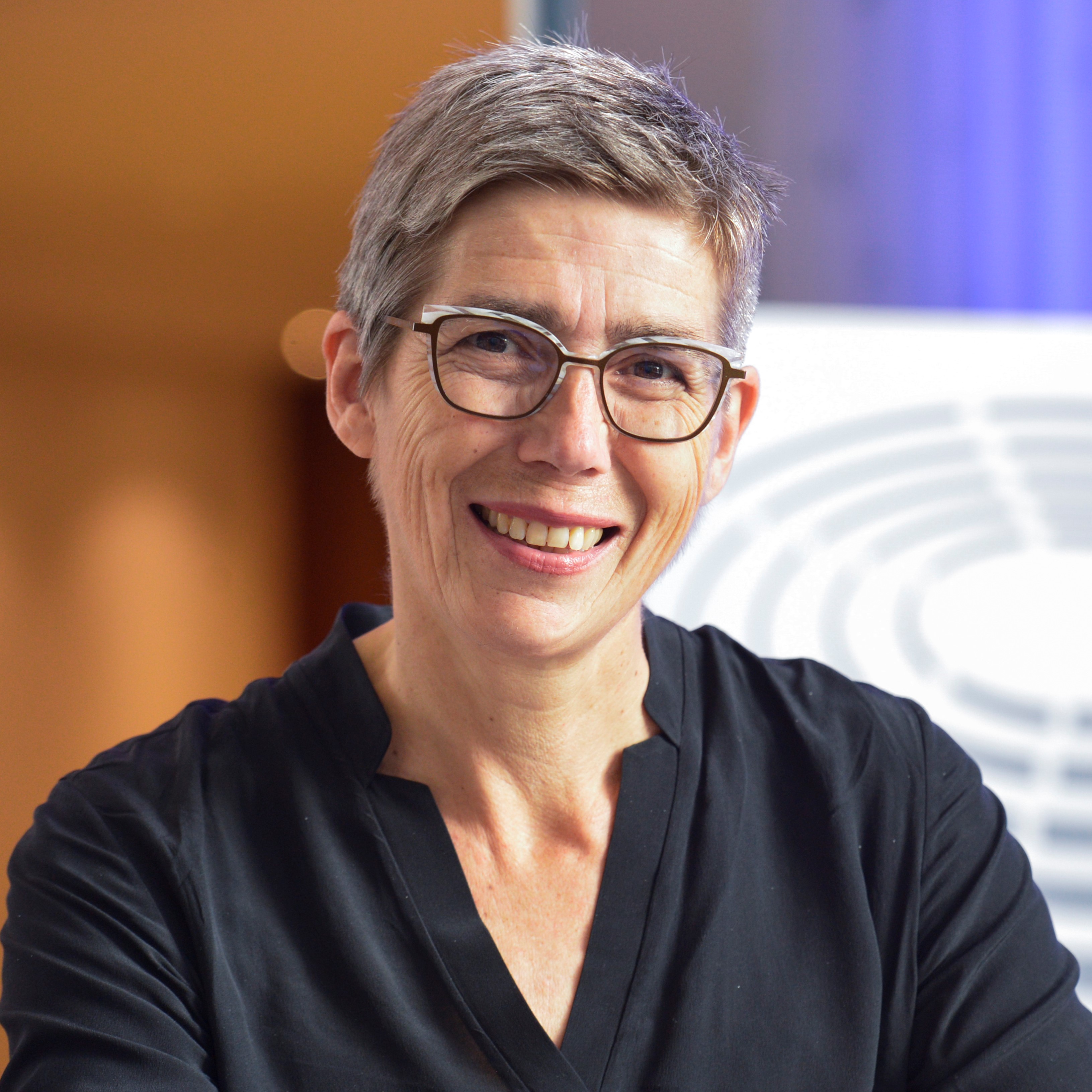
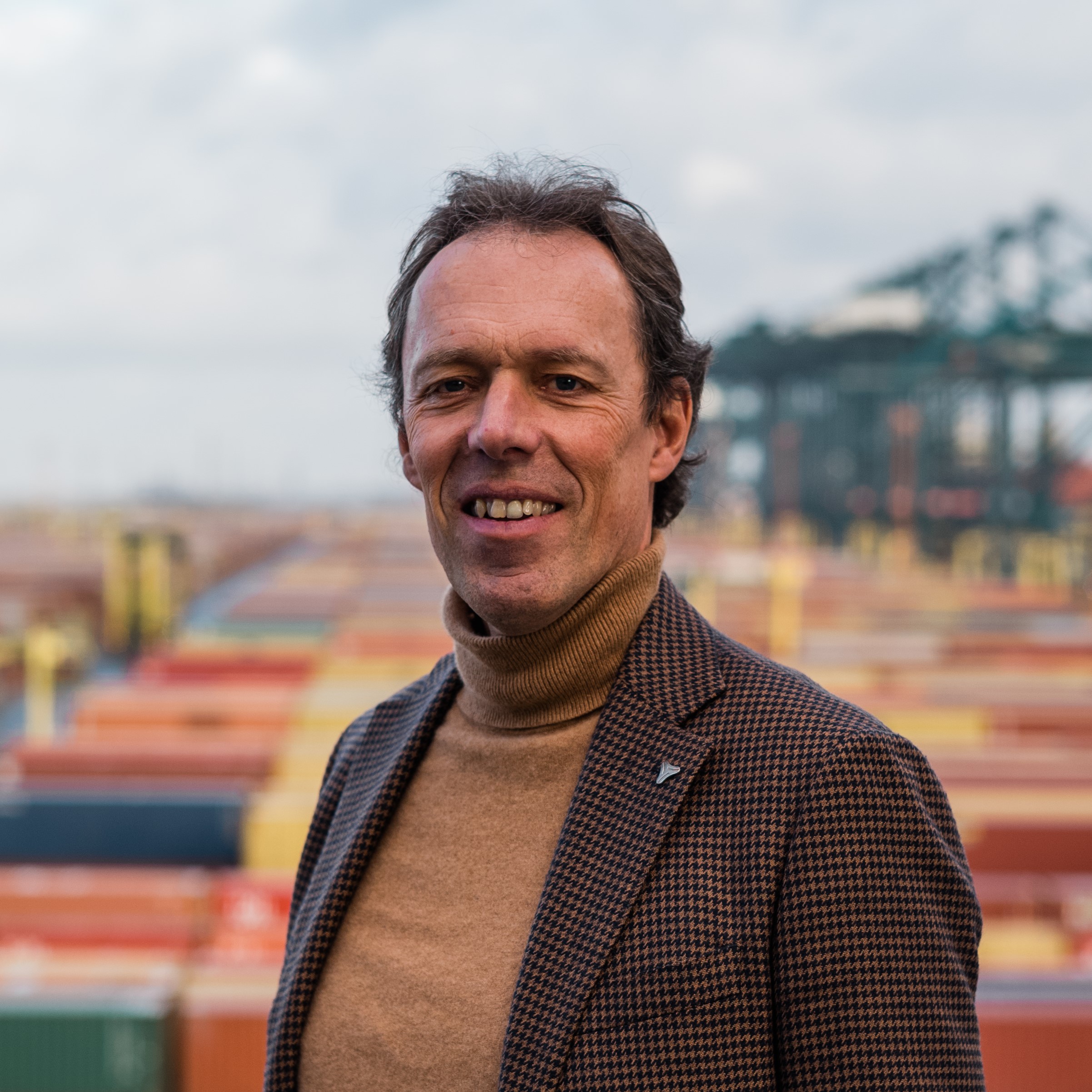
Jacques Vandermeiren
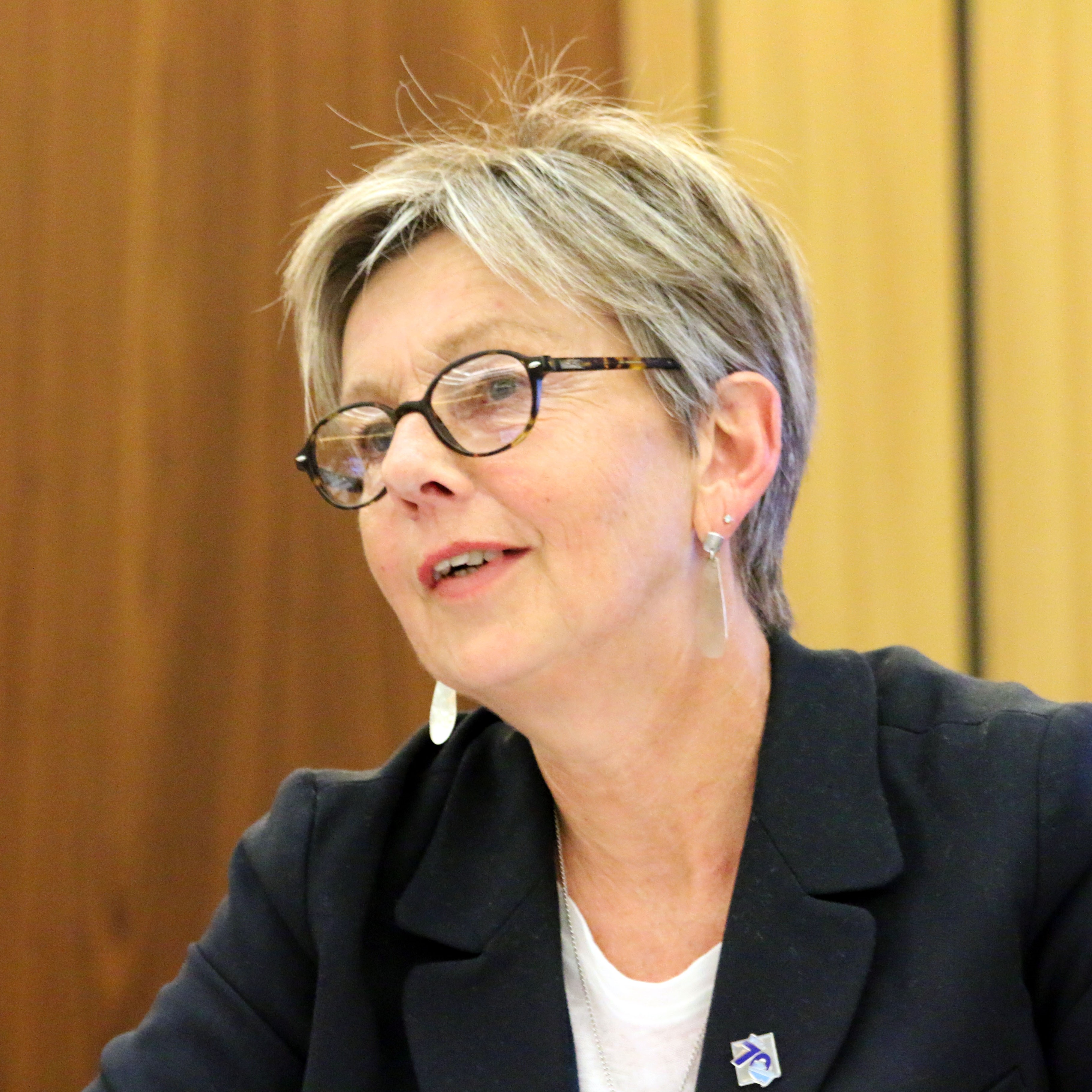
Diane Gilpin

Simon Bullock

James Mason
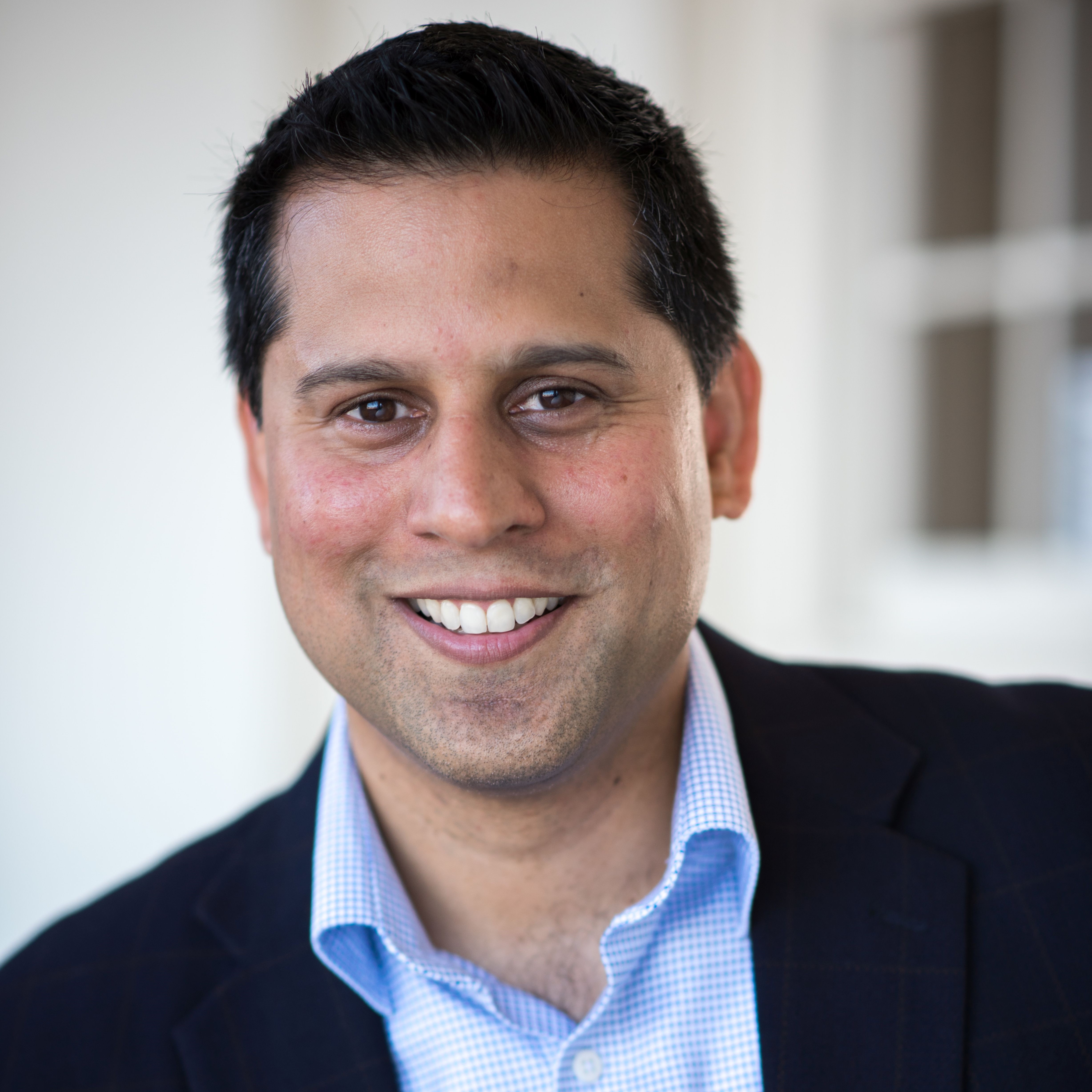
Nishan Degnarain

Jules Kortenhorst
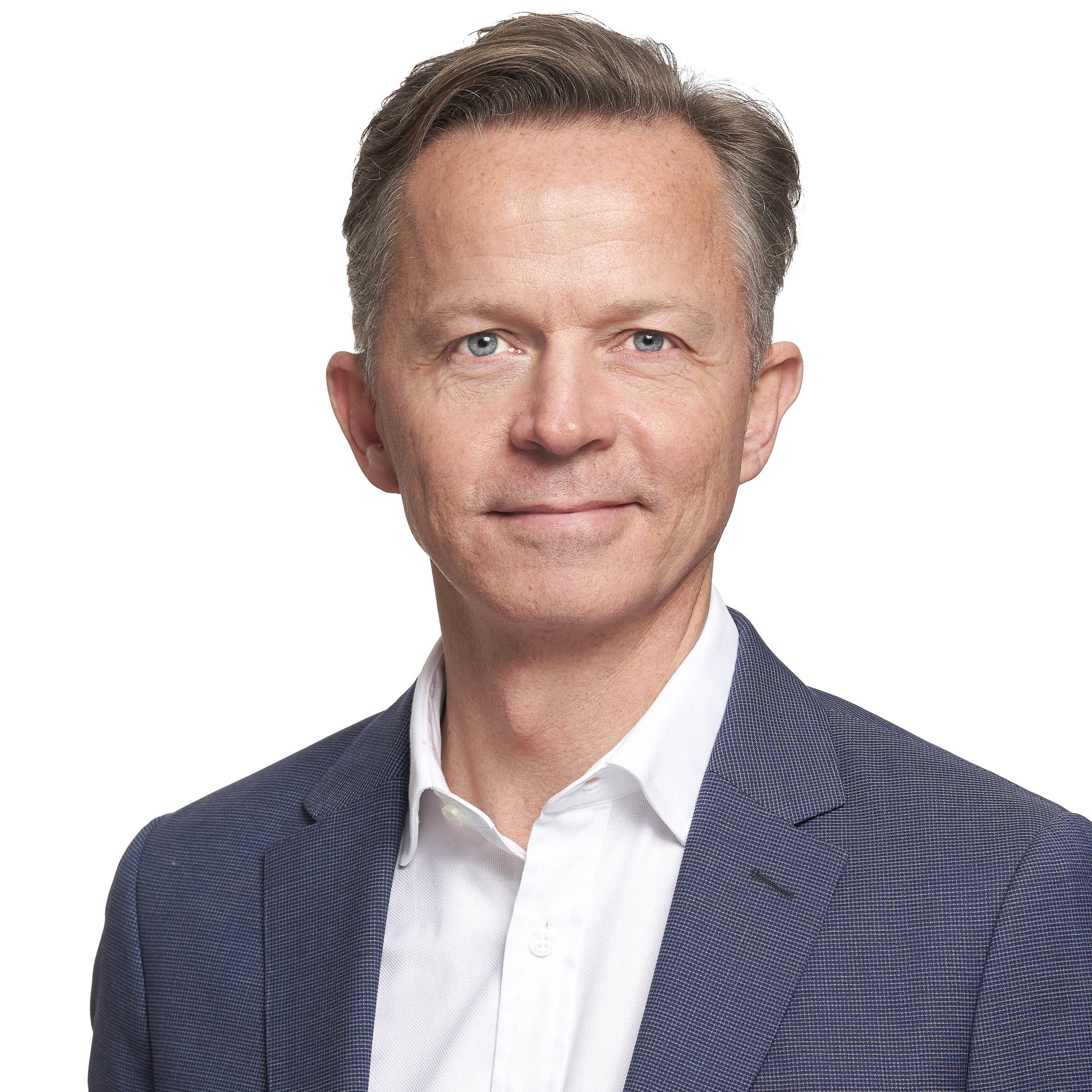
Erik Lewenhaupt
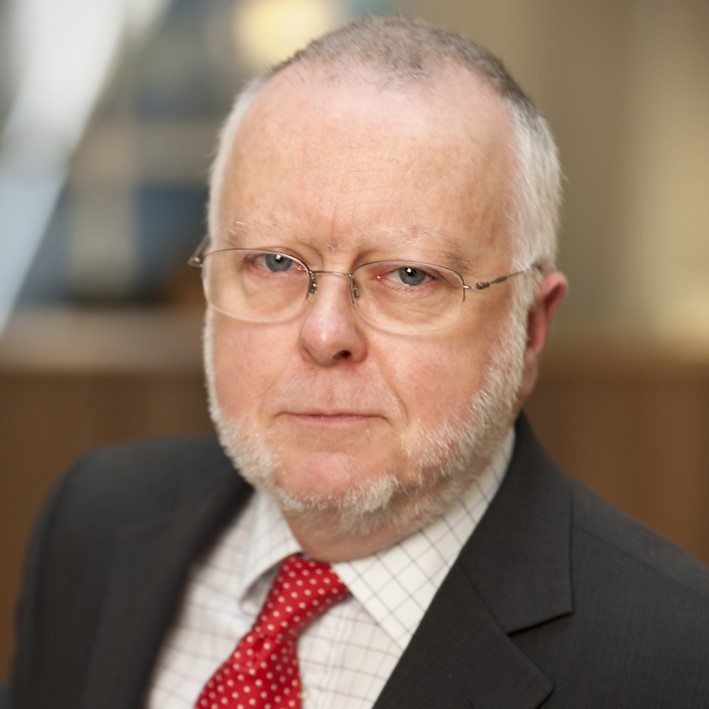
Peter Hinchliffe
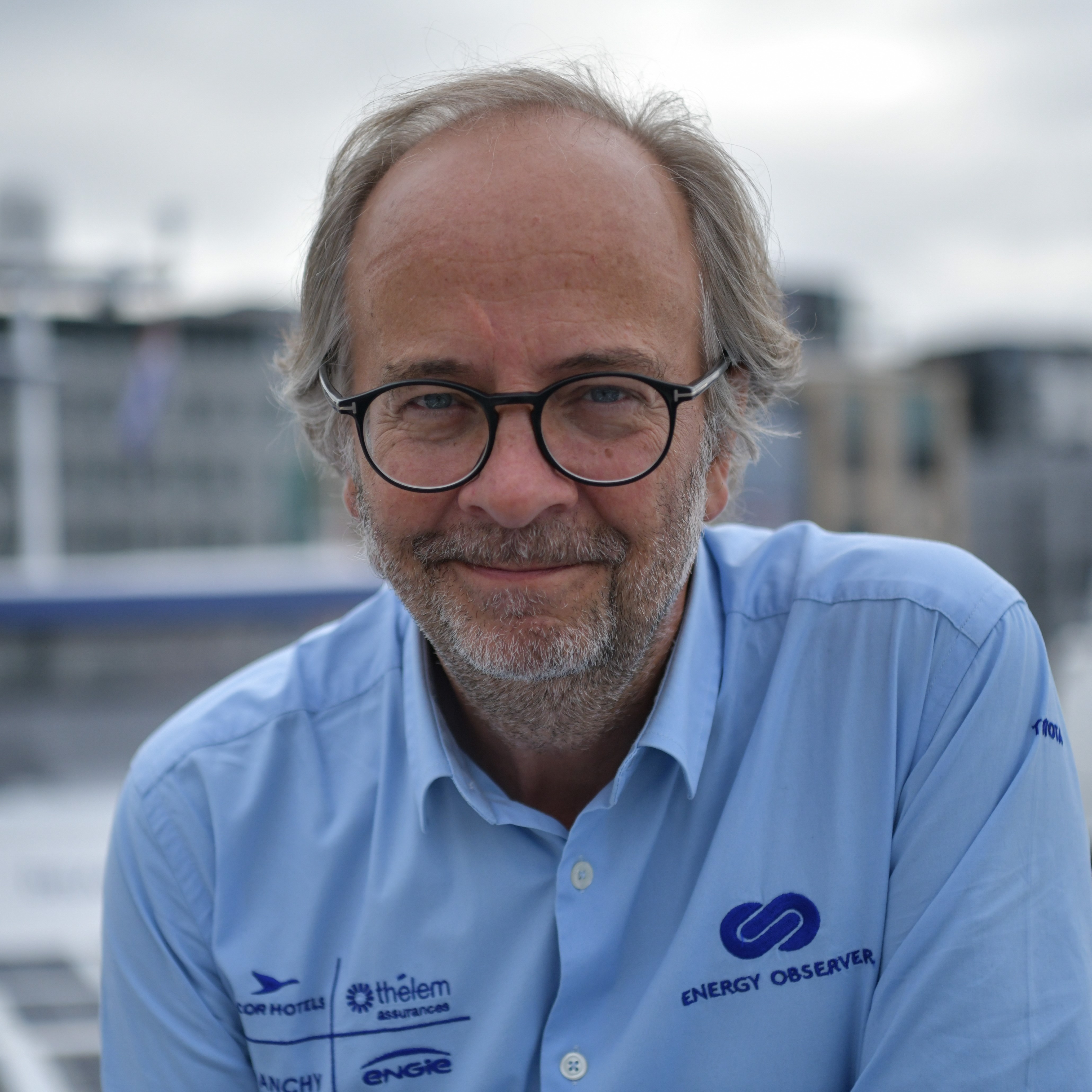
Louis-Noel Vivies
-1.jpg)

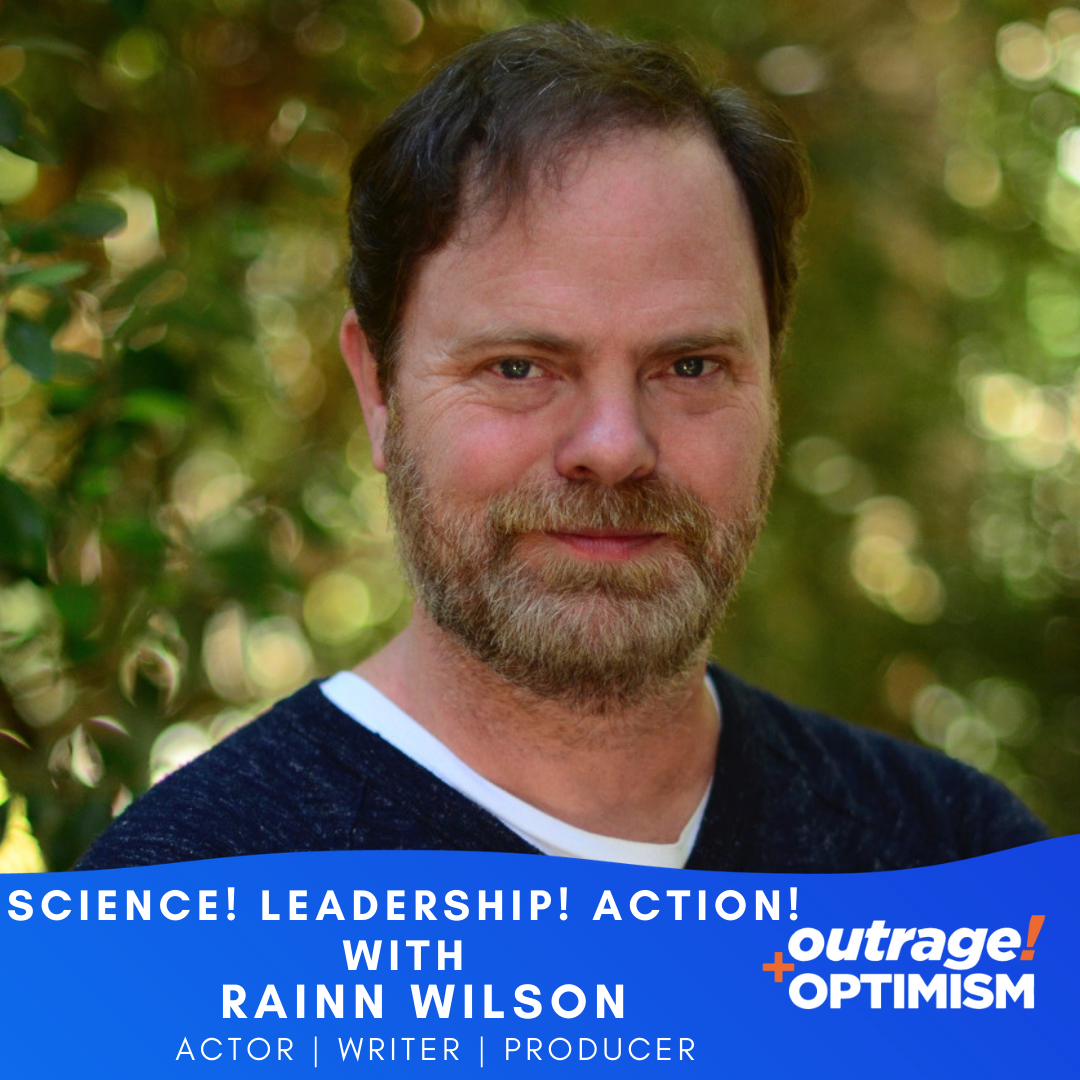
.png)
